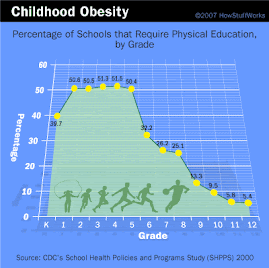To change our children's diet. By changing and monitoring what our children are eating, as parents, we can make sure they are getting all the proper nutrients they need. It is suggested that instead of focusing on weight loss, it is healthier for obese kids to maintain weight while they still have growing and developing to do. It is in no way healthy for children to start eating a diet that is low in calories and nutrients. Although the short term results of a low calorie diet are successful; the success is short term. Weight is easily gained back once more calories are obtained. A low calorie diet can also inhibit growth and development.
Research suggests the best solution is a diet full of vitamins and nutrients. Especially one important nutrient: Fiber. A diet high in fiber has many positive effects on assisting in weight loss and maintaining a healthy life style. Fiber can be found in many foods.
There are two different types of fiber. There is soluble and insoluble fiber. Soluble fiber can be found in apples, bananas, pears, plums, prunes, broccoli, carrots, lettuce, beans, potatoes, sweet potatoes and onions. Insoluble fiber can be found in whole grains, nuts, seeds, wheat and flax seed. Both insoluble and soluble fiber are necessary for a healthy diet.
For those who don't have a diet high in fiber, they can use fiber supplements. Most Americans do not meet the recommended dosage. For adults is is recommended to consume at least 20-35 grams/day of fiber. For children glucoomannan is a healthy fiber supplement to assist with maintaining a healthy weight.
*****Vitamin World is having a huge SALE on whole website. 20-50% off!! $1.95 Shipping and Handling!!!!!!!*** Amazing deal! Order Below!******
Dietary fiber functions & benefits
| Functions | Benefits[25][26] |
|---|---|
| Adds bulk to your diet, making you feel full faster | May reduce appetite |
| Attracts water and turns to gel during digestion, trapping carbohydrates and slowing absorption of glucose[27] | Lowers variance in blood sugar levels |
| Lowers total and LDL cholesterol | Reduces risk of heart disease |
| Regulates blood sugar | May reduce onset risk or symptoms of metabolic syndrome and diabetes |
| Speed the passage of foods through the digestive system | Facilitates regularity |
| Adds bulk to the stool | Alleviates constipation |
| Balance intestinal pH[28] and stimulates intestinal fermentation production of short-chain fatty acids | May reduce risk of colorectal cancer[29] |
For more info on the amount of fiber in foods visit here.
.




















